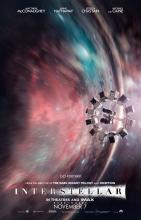inspiration + perspiration = invention :: T. Edison ::

Interstellar, the newest movie from the Nolan brothers, is not the greatest film ever made; it is not even the greatest science fiction film ever made. It is not awe-inspiring, achingly beautiful, nor fun as all get out.
Now that I've gotten the superlatives out of the way, I can say what it is: a well-crafted, solidly told tale that dares to treat its audience with the same respect good authors give their readers. The protagonist and promos may wish to inspire us to leave this world behind, but the creators know that it is our very connection to this world, and most especially those on it, that make any story worthwhile. It is, in fact, the first movie I've ever seen that actually delivers the same experience as reading a good book.
Given how rare such an achievement is, I can understand why the superlatives are rolling out.
The movie begins in an imagined future where blight and famine have caused nations to retrench: dissolving militaries, retooling education, and growing a sustainable tomorrow. But former pilot turned farmer Cooper believes there is more to life than programming combines. He pushes his children to question the world around them, such as when his ten-year-old daughter Murphy complains of a ghost knocking over books in her bedroom.
The simple scientific investigation he suggests leads to a secret government program focused on finding a new home in space for mankind, and Cooper is given the responsibility and privilege of flying this mission to the outermost reaches of the universe. But he and his fellow explorers face many hazards: the unknown perils of space flight, the possibility of years or even decades away from the ones they love, and the human fallibility that mars even our best intentions.
Nothing about this film, as I said in my first paragraph, is so very remarkable in and of itself. The plot, encompassing such typical science fiction tropes as wormholes and multidimensional time, shows the influence of many science fiction greats. The planets these explorers discover are intriguing if not wildly creative. The ship designs are a good blend of the past and potential future of space flight. The filmmaking is good, not amazing. Plenty of movies have created far more vivid or immersive renditions of the future.
Why the breathless reaction from so many for this film, then? I believe it is not so much a matter of what this movie does, nor even how, but why. At the heart of this movie is a storytelling mindset best summed up by Mr. Rogers: "Deep and simple is far more essential than shallow and complex." For such a long film, Interstellar slices away all extraneous notions to emphasize the story's essentials: love between a father and his children, fear of death and disappointment, and the transcendence found when we put the needs of others before our own.
This essentialism, as I'll term it, allows the film to draw audiences in with the same spellbinding charm that bedtime stories and great novels possess. It doesn't add unnecessary elements for the sake of gaining a wider audience: there are no trumped up fisticuffs or love triangles, few characters, and little discussion of the greater world beyond the main characters. These people do not behave in certain ways merely to buoy the plot forward: the story contracts and expands in breadth as they themselves reapply focus, allowing we in the audience to be drawn out of our own selves. The Greeks termed this feeling "catharsis," and while it's usually associated with tragedy, great drama as surely inspires.
The movie should answer once and for all whether Hans Zimmer can compose outside of his usual percussive mindset. This soundtrack is like the film itself: nothing hummable or beyond experience, but fully alive and perfectly suited to the story it accompanies. Costars Matthew McConaughey and Anne Hathaway deserve special mention for delivering performances that stand on their own apart from both actors' greater bodies of work. Hathaway especially carried a very emotional scene in such a way as to supplant any attempt to pigeonhole it in the thousand little boxes we've developed for actresses. Her Amelia Brand is able to live as a fully formed human being, with a determination of equal if differently pitched fervor as that of McConaughey's Cooper.
There's much more to be discussed about this film, for all my going on about its simplicity: its treatment of how technology and humanity might work together in the future, the responsibility of scientists to the people supporting them, the science of blackholes and time itself. But I'd prefer to address those ideas in later blog posts, preferably after more people are able to experience this story for themselves. I know I'd like to see it a few more times before fully exploring these ideas.
One final word: despite my deep enjoyment and appreciation for this movie, I hope it doesn't become too much of a darling in the geek world. Holding Interstellar up as some rallying cry for the future of genre filmmaking would be a mistake. It's not a pinnacle: it's a stepping stone, one that owes as much to the success and vision of far different movies as it will hopefully inspire for ones as equally diverse moving forward. The increasingly crowded landscape of fantastical media doesn't necessarily need more movies that think or feel like Interstellar.
It needs ones that can cohesively shape and tell their own stories just as well.





